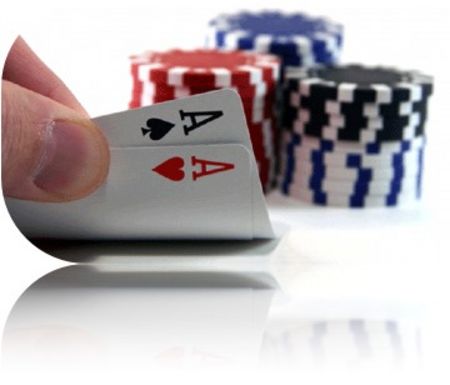The Turn

The turn is one of the more difficult rounds to play in Hold'em. The bets are
doubled, so the true strength of everyone's hands is usually communicated. Many
players will often call a cheap bet on the flop hoping to hit overcards, gut-shot
straights, two pair, etc., but will often fold these hands on the turn when the betting
becomes more expensive. Since bets are doubled, any mistakes on This round of
betting can become very costly.
Staying the Aggressor with Strong Hands
A common situation in Hold'em is that you raise preflop and then either bet or raise
on the flop. Generally, you should continue to be the aggressor on the turn with a
strong hand, although there are a few exceptions. For purposes of this section, a
strong hand is one that you are relatively confident is currently the best hand.
When acting early with a strong hand, your two options are betting out or trying for
a check-raise. Generally continue to bet when you are unsure that an opponent will
bet and giving a free card would be dangerous. Against several opponents with a
large pot, you might consider checking, hoping that a late position opponent will bet
so that you can check-raise to drive out your remaining opponents.
If a free card would not be too dangerous, a check-raise can sometimes be a good
strategy to gain extra bets against your opponents. You gain extra bets by either
inducing your opponents to bet a weak hand that they would have folded or by them
calling a check-raise. If they don't bet, you might gain a crying call on the river when
you come out betting.
Checking also gives you equity in future hands. If your more observant opponents
notice that you always bet out your strong hands, they will steal many pots when
you check. On the other hand, if you check-raise a lot, they may tend to steal less in
fear that you might check-raise. This could give you a tree card, which might
improve your weaker hands to the winning hand.
Let's look now at your options when acting after your opponents. Whenever your
opponents check, you should almost always bet your strong hand. You want to earn
bets! You need to continue to put pressure on your opponents and make them pay
a price for their draws. Giving free cards can be dangerous, as opponents can
sometimes hit a miracle card to beat your hand. If you are check-raised, you can
then evaluate how strong your hand is compared to your opponent's possible
holdings (see Calling Raises).
When you are worried that an opponent may have hit a draw and he checks, tend
to check hands with outs and bet hands with few or no outs. If you are check-raised
when you have few outs, you can safely fold. For example, you hold A ♣ K ♠ with a
K ♦ Q ♦ 5 ♣ 9 ♦ board against two opponents.
If your opponents check, you should
usually bet since you do not want to give a free card. If an opponent then check-
raises, you are most likely beat and can safely fold. However, if you hold K ♣ Q ♣
with the same board, you might consider checking since you have four outs that
could beat either a flush or straight.
There is another scenario when you might consider checking the turn in late
position rather than continuing to be the aggressor. If you are relatively confident
that your opponents will fold, and the risk of a free card hurting you is minimal, you
might check when the pot is relatively small. This kind of play could gain you an
extra bet in three different ways:
-
You might induce an opponent into making a bluff on the river.
- An opponent might improve to a second-best hand and will now either bet or
call on the river.
- You might induce a crying call on the river. For example, an opponent might
call with ace high or a weak pair if he thinks your check on the turn indicated
weakness.
Internet Tip
On the Internet, players tend to be a little more aggressive than in live play, so this kind of play
works even better online than in a live game since many opponents can't resist trying a bluff at the
pot.
This type of play should not be used too often. It is often difficult to know when your
opponents will fold, and most hands are not strong enough to be able to give a free
card. In addition, sometimes an opponent might be slow-playing a strong hand
weaker than yours and you could lose the opportunity to gain a few bets on the
turn.
For example, you raise preflop with KK and bet the flop with a K ♣ 8 ♥ 2 ♦ 5 ♣ board.
What should you do if your opponent checks? A free card could only hurt you if your
opponent has a runner-runner flush opportunity. However, what could your
opponent have been calling with on the flop? He might have the last king or
possibly 88 or 22, in which case you would lose a lot of bets by slowplaying your set
on the turn. If your opponent calls on the flop with this type of board, there is a
decent chance he will call the turn also, so usually go ahead and bet. What if the
board is K ♣ 9 ♣ 2 ♦ 5 ♥? Giving a free card in this case is dangerous, because your
opponent could be on either a flush or gut-shot straight draw.
Let's look at an example when you might consider checking. You hold T ♣ T
♦ with a
T
♥ 6
♦ 2 ♣ 3 ♠ board. You might consider checking this hand on the turn against a
strong opponent if the pot is small and it is unlikely he holds a small set based on
your opponent's position and betting on previous rounds. Your opponent might be
playing two overcards and would probably fold if you bet. Note that I specifically
referred to your opponent as a strong opponent. Never give up betting opportunities
against weak opponents who will call with all kinds of hands.
NEXT...
Staying the Aggressor with Weak Hands

